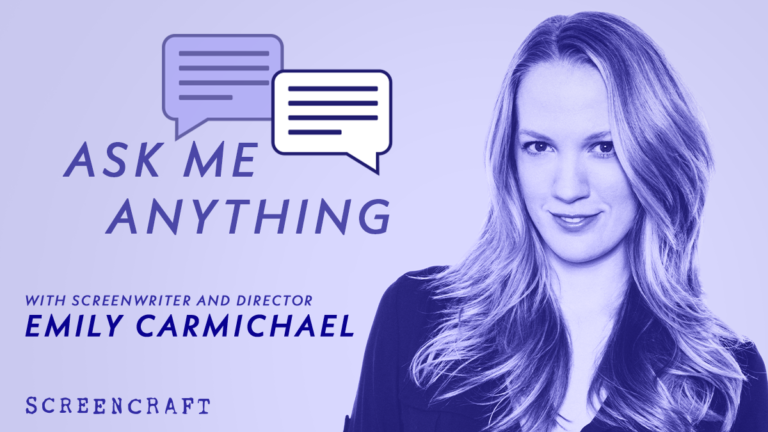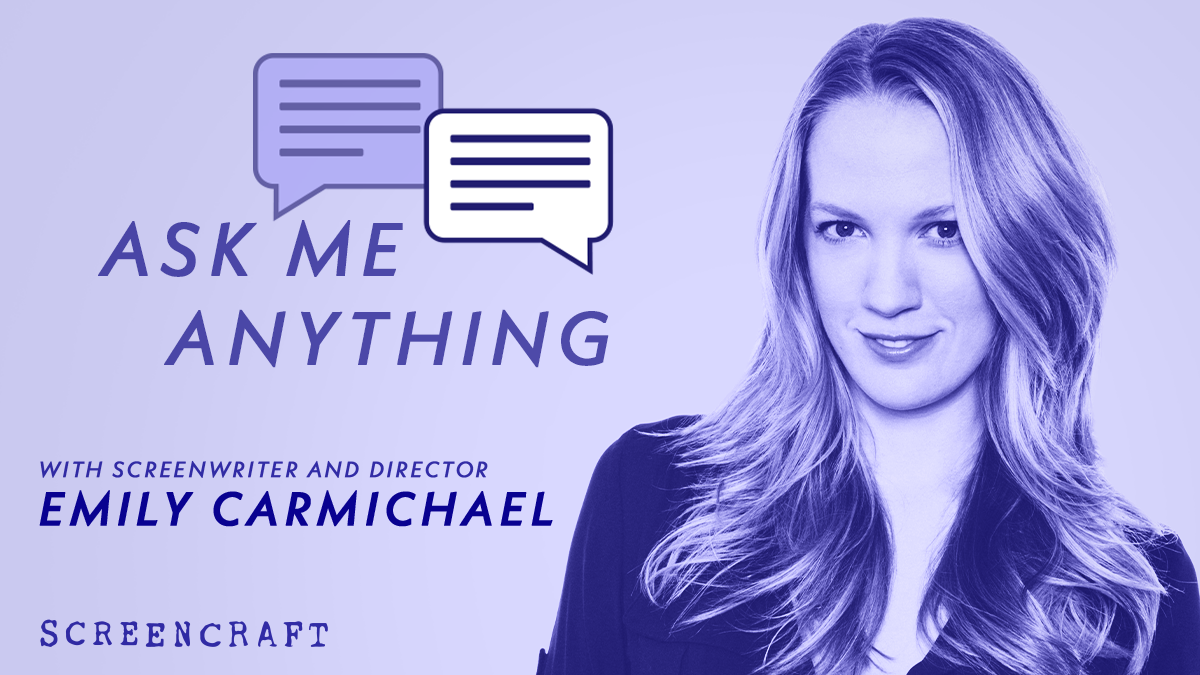15 Action Screenwriting Tips from Emily Carmichael

Acclaimed screenwriter and director Emily Carmichael has built a reputation for weaving compelling, action-packed stories and crafting complex action heroes that appeal to a broad audience. Her credits include writing and directing big-budget action projects like Pacific Rim to most recently writing Jurassic World: Dominion. She's also working on the Disney reboot of the 1979 sci-fi film The Black Hole.
In a recent ScreenCraft AMA, Emily spoke with three-time Emmy award-winning producer, director, writer, and cinematographer Kevin Bachar about her writing process, time management techniques, and how she creates blockbuster action movies. You should watch the entire video (it's great). But if you don't have time, here are six of the biggest tips and takeaways from Emily Carmichael's fast-paced AMA on how she approaches writing an action screenplay.
Emily Carmichael is a juror for ScreenCraft's Action & Adventure Screenplay competition.
Table of Contents
How to get started as an action screenwriter
Emily got her start as a playwright and director while attending Harvard University and then a film student at New York University’s Tisch School of the Arts. Her advice for evolving into a high demand action-adventure screenwriter and director is simple — create an outline.
"There's nothing boring about writing with an outline," Emily said. In fact, Emily points out that this key step can help writers avoid problems further into the writing process, and it can speed up the writing phase of the project. Speed and problem-solving are just part of how she's collaborated on Hollywood blockbusters and gained popularity with her short films across the festival circuit.
Emily also stresses that writers need to research their subjects with purpose. Focus on studying subjects and places that will help you move the story forward and create meaningful set points. Lastly, Emily advises new and emerging screenwriters to tailor their writing to specific genres.
"If you want to get into a certain genre, you should make work as close to the genre that you can." Emily points out that she typically avoids genre-blending in order to keep her work clear and focused.
Time management tips for screenwriters
Screenwriting is a job, and that means hitting goals and writing on a schedule. To help manage expectations, combat writer's block, and churn out top-level scripts, Emily recommends these three techniques that help keep screenwriters on target:
- Be honest with how much time you want to dedicate to a particular project. It's tempting to say "yes" to every project that comes your way, but being overly accommodating is only going to add complications down the road. Be clear and communicate your capabilities honestly and you'll be off to a much better (if slightly slower) start.
- Set reasonable goals. Be realistic with your schedule, so you can make progress with attainable timetables.
- Use the Pomodoro technique. “My number one piece of advice is: use the Pomodoro technique,” said Emily. [41:15] This one technique can improve the quality of your writing time and combat writer’s block. Work for a specific interval of time and then take a break. Repeat. Emily also recommends keeping a journal of your workflow.
How to write a compelling story
Emily's advice for action set pieces is both universal and specific. Use set points with intention. Every set piece in your script should propel the story forward. “There is so much that can happen doing set pieces. I just go for it," she adds. "Don’t hold back on your set pieces.”
Emily also encourages screenwriters to be as creative as possible while keeping the stakes high. "When the stakes are life or death, that is a story." Look for ways to add different moods, weather elements, and terrains to scenes to keep audiences interested.
How to pitch your action screenplay
Sadly, writing a great script is only half of the story. To become a successful screenwriter you have to make other people care about your story. And that means mastering pitch meetings.
Screenwriters need to develop skills beyond writing that allow them to effectively explain the essence of their film. Emily implores writers to lead with their passion, and tell the human story of their screenplay—not a summary of the plot. "A pitch is not a summary of the screenplay," Emily warns. Aside from this guiding principle, Emily's advice for pitching your script is all about being prepared and managing expectations:
- Be prepared. Emily advises writers to create a document of what you will say during the pitch. Remember to write it in a conversational style
- Get to the root of your story. Avoid getting bogged down in too many details or a lengthy summary of the plot
- Tell people how your story will end. A pitch meeting is not the time to keep people in suspense. Nobody wants to buy a screenplay without knowing how it's going to end
- "Don't be afraid of your excitement," warns Emily. Genuine emotion can help people get excited about you and your screenplay, and according to Emily, enthusiasm and authenticity can be huge assets when it comes time to sell your script.
Action screenwriting success
There's no fast-track to screenwriting success. However, there is a carpool lane. You can increase your odds of gaining attention and interest in your scripts if you follow Emily's three pieces of screenwriting career advice:
- Enter contests. Screenwriting contests are a great way to gain experience, get feedback, and grow your body of work.
- Build relationships. Part of getting an agent or a paid gig is to form connections until you find people that trust and care about your work. Develop partnerships with screenwriters, directors, and other people in the industry.
- Complete your first screenplay. Emily warns against trying to write the perfect script on your first try — because it probably won't happen. “To write something great you will probably have to write a bunch of things that aren’t great.”
Reaching the finish line
According to Emily Carmichael, “A screenplay is done as soon as you can stand to have another person read it.” [56:30] The first step to becoming a successful screenwriter is finishing your script. The second step is getting that script into the hands of people that can do something with it.
If you have a finished action or adventure script that you can stand to have someone else read, now is the time to submit it to the ScreenCraft Action & Adventure Screenplay competition. Take the next step in your screenwriting career and submit to a jury of professional writers, producers, directors, agents, and industry insiders like Emily Carmichael.
Get Our Screenwriting Newsletter!
Get weekly writing inspiration delivered to your inbox - including industry news, popular articles, and more!




























